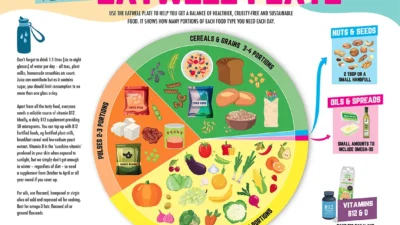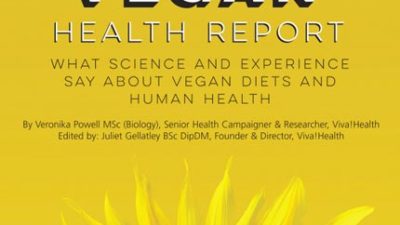What is a healthy, balanced vegan diet?

A balanced diet should include meat and dairy according to the meat and dairy industries. Like much of what they say about health and the environment, it isn’t true and cutting meat and dairy out of your diet will not only benefit your health but help combat both the climate crisis and loss of wildlife.
A healthy, balanced vegan diet, focussed on fruit, vegetables, wholegrains, pulses, nuts and seeds, offers a multitude of health benefits, including a reduction in the risk of all the big killer diseases. With some simple swaps, you can enjoy a wide range of classic favourite dishes plus new and exciting ones, too. If you follow some basic guidelines, you will soon reap the health benefits, including having the occasional treat.
Nutrition essentials
Variety is key, go for richly-coloured fruit and veg to get the greatest benefit – purple sweet potatoes, red cabbage, carrots, kale, spinach and berries – eat the rainbow!
Research suggests we should aim for at least five portions of fruit and veg a day and the ZOE Health Study recommends 30 different plant foods a week. It’s not as hard as it sounds as it includes grains, nuts, seeds, herbs and spices!
Choose wholegrain varieties of food: wholemeal bread, brown rice, wholewheat pasta, oats and quinoa – they release energy more slowly, which helps you feel fuller for longer and also helps to control blood sugar levels.
But where do vegans get their protein?
This is the tired old question that’s frequently asked. All plant foods, except extracts such as oil and sugar, contain protein and if you eat a varied diet, that provides enough calories, you will get enough protein.
Adults need around 45 to 55 grams a day but many people in the UK get a lot more than that and too much protein, especially animal protein, can be harmful. The best sources of vegetable protein are pulses, tofu, wholegrains, nuts and seeds.
Be sure about B12
Everyone needs a reliable source of vitamin B12 to help keep blood cells and nerve cells healthy. It’s produced by bacteria that live in the soil and traditionally, humans and animals got it by eating unwashed foods. Food production is now so sanitised that we need a supplement – and not just us but farmed animals too, and for the same reason. So, contrary to industry claims, meat is not a ‘natural’ source of B12. Cut out the middleman and take your own! Viva! suggests a daily supplement providing 50 micrograms. You can top up with B12-fortified foods such as plant milks, breakfast cereal and yeast extract.
Don’t forget vitamin D
We all need vitamin D for healthy bones, teeth, muscles and many other essential functions and it’s made by the action of sunlight on our skin. Most people can get enough during summer but in the UK’s gloomy winter, a supplement should be considered by everyone, regardless of diet.
Vitamin D can also be obtained from fortified foods such as plant milks, margarine, vegan breakfast cereals and ‘vitamin D mushrooms’ that have been exposed to UV light (they’re normally labelled as that). The safest option, though, is to take a daily supplement – 10 micrograms is recommended. Vitamin D2 is always vegan whereas D3 is usually of animal origin (derived from sheep’s wool) but can be obtained from algae or mushrooms – check the label.
Calcium, omega-3s and other nutrients to keep an eye on
Calcium provides the building blocks for bones but only works properly if you get enough vitamin D to help absorb it. It’s a myth that you need dairy for calcium, particularly when you consider how 70 per cent of the world’s population are lactose intolerant and don’t consume any dairy! A varied vegan diet, rich in wholegrain foods, leafy greens, pulses, nuts and seeds (tahini is a great source), calcium-fortified plant milk and calcium-set tofu (check ingredients for calcium sulphate) will cover your needs.
Omega-3s are a type of polyunsaturated fat that we need to stay healthy. You can get them from nuts, seeds and their oils and one or two teaspoons of flaxseed oil, or a handful of walnuts plus a tablespoon of ground flaxseeds daily, can provide all you need.
Oily fish are vigorously promoted as a source of omega-3s but fish don’t produce it, they get it from the algae they eat. Sustainable vegan supplements containing omega-3 fats EPA and DHA produced from algae are available and don’t contain the toxic contaminants found in fish oils.
Three nutrients many people fall short of in the UK, regardless of diet, are iodine, selenium and zinc. For vegans, these can all be easily obtained by a few simple additions to their diet. For iodine, an occasional small amount of arame, wakame or nori seaweeds can keep you topped up. Some plant milks also now contain iodine. The dairy industry likes to promote cow’s milk as an important source but it’s not a natural component of cow’s milk but comes from animal feed supplements, medication and sterilising teats and udders with iodine-based solutions!
Brazil nuts are an exceptional source of selenium and a couple a day will help you meet your needs. Other good sources include sunflower and sesame seeds, wholegrains, tofu, asparagus and mushrooms. Lastly, zinc can be found in wholemeal bread, wholewheat pasta, tempeh and tofu, quinoa, beans, lentils, nuts and seeds – especially pumpkin seeds.
Limit processed foods
Often when people go vegan, they rely on processed, plant-based meat alternatives – vegan sausages and burgers, for example. They are often tasty, easy to cook and can be helpful for people transitioning to a vegan diet. However, they tend to contain higher levels of fat and salt than wholefoods and cannot be considered a healthy food. If you do eat meat alternatives, try to limit them to just once or twice a week. They also tend to be more expensive than wholefoods so using them sparingly makes financial as well as nutritional sense – try swapping mince for brown lentils and chicken for chickpeas!







